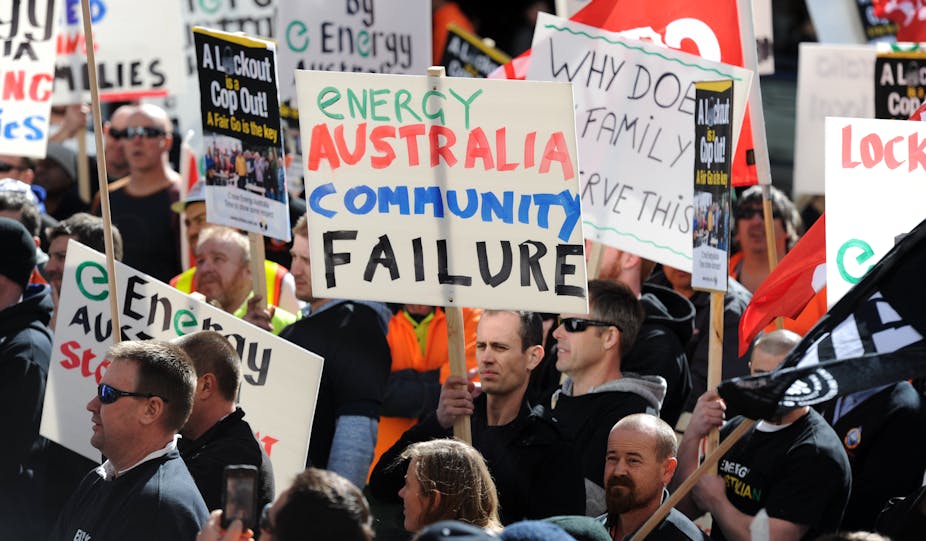Over the course of the last few months, industrial relations has once again become a major issue on the national political agenda. Allegations of union corruption, uncompetitive wage deals, inflexible modern awards and unsustainable work arrangements have been blamed for a growing number of economic problems.
As Michelle Grattan has noted recently, the IR climate is now “brittle”. Tempers have flared on all sides.
The government is intent on taking a hard line on unlawful union behaviour and has signalled that it will intervene in the Fair Work Commission’s upcoming review of modern awards.
Prior to the last election a Productivity Commission review into the Fair Work Act was promised. Although the terms have yet to be announced, it will no doubt be comprehensive. Joe Hockey has already indicated that he sees further labour market deregulation as critical to boosting productivity. Senior ministers have also asked employers to toughen up when it comes to enterprise bargaining.
Employers have been critical of the Fair Work legislation for some time. The Australian Mines and Metals Association, for example, took 25 recommendations for reform to the Review of the Fair Work Act in 2012.
The Business Council of Australia has also made clear its list of priorities for changing IR laws, as have other employer groups. Common among all of them are concerns that the new rules for enterprise bargaining, included in the Fair Work Act, have provided unions with a “leg up” and driven up wages costs.
Because of the historical importance of awards and arbitration, collective bargaining has in fact been less significant in Australia than in other industrialised economies. However, since 1991 the year the first principles for enterprise bargaining were put in place by the industrial tribunal, enterprise bargaining has grown in importance. Since then, successive governments have developed increasingly elaborate rules for bargaining, taking industrial action, and making agreements.
The Fair Work Act represents an important stage in the development of these bargaining rules because it places the concept of “good faith” at the heart of enterprise bargaining. The idea of “good faith bargaining” has developed in many other contexts, but is most closely associated with collective bargaining systems in the US and Canada and, more recently, in the UK and NZ.
Under the Fair Work Act, the good faith bargaining provisions require employers, unions (and other “employee bargaining representatives”) to, for example, give genuine consideration to the other parties’ proposal. Importantly, the law does not require the parties to make concessions or reach an agreement. The guiding principle is that “good faith” should facilitate genuine bargaining, but not compel agreement.
Figure 1 below shows the total number of live agreements made each quarter. The growing importance of enterprise bargaining since 1991 is evident. The Figure indicates that immediately after the Fair Work Act came into force (in July 2009), there was a jump in the number of enterprise agreements made. However, many unions have clearly found it increasingly difficult to make agreements. Within just twelve months after the Act became law there has been a marked fall in the number of agreements made.

Unions have also struggled to hold the line in terms of coverage as Figure 2 shows. Again, the introduction of the Fair Work Act was associated with a boost in the number of employees covered by enterprise agreements. This growth has tapered off to such an extent that the proportion of the workforce covered by enterprise agreements is now falling. This is true for both the private and public sectors.

These figures hide a more significant trend: an increasing proportion of enterprise agreements are now made without any negotiations with unions or without unions being a party to the agreement. Indeed, our analysis of the Federal Government’s own agreement data shows there are now more non-union enterprise agreement struck directly with employees than there are agreements made with unions.
What conclusions can be drawn from this evidence? In short, whatever problems the Fair Work Act has caused – and there are no doubt some – in the main, the new bargaining provisions have not been as favourable to unions as many have suggested.
The trends indicate that many employers already appear to be toughening up – either looking to work around unions through non-union agreements, or by avoiding enterprise bargaining altogether.
This conclusion is consistent with the wage data. The evidence from enterprise agreements – backed up by the ABS Wage Price Index series – shows that wages growth has followed a stable pattern – and since 2010 the trend has in fact been towards lower wages growth.
On the productivity front, the evidence is at best mixed, but the most robust economic studies suggest the productivity dividend associated with enterprise bargaining is hard to find.
Getting workplace relations right is obviously important, but it may be that we expect too much from legislation and the formalities of enterprise agreements. If we are to improve productivity, and generate more innovation and creativity at work, better leadership and more capable management may be a better place to start.

